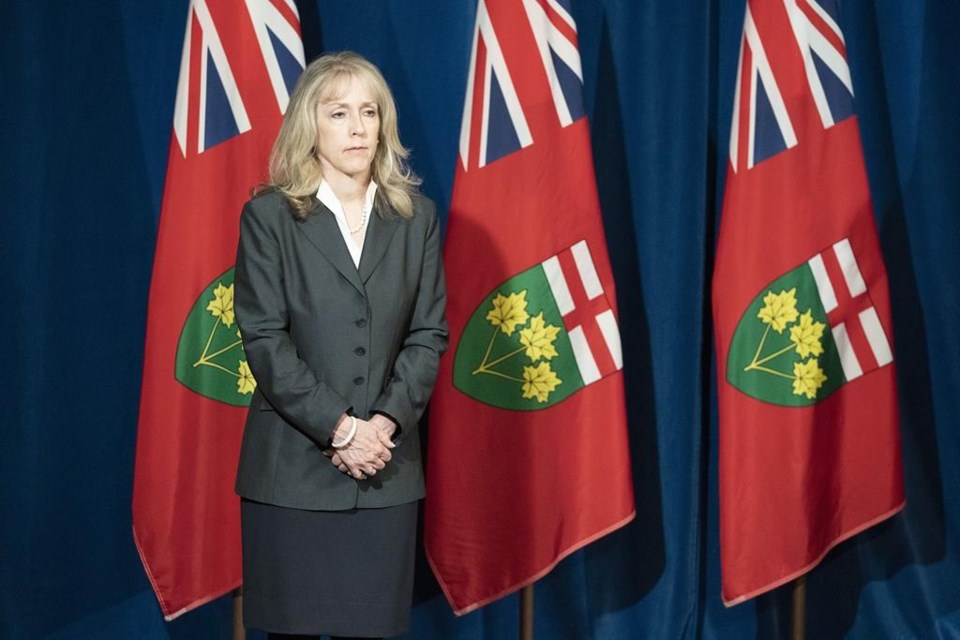TORONTO — Staff at Ontario's nursing homes can now be granted anonymity when testifying for a commission examining how COVID-19 spread in the province's long-term care system, the government said Tuesday as it moved to shield the workers from reprisal.
Long-Term Care Minister Merrilee Fullerton said the three commissioners leading the independent probe asked for the provision after employees cited fears of losing jobs or having their hours reduced for speaking out.
Fullerton said the government wants the Long-Term Care COVID-19 Commission to hear workers' stories.
"We need to hear from the personal support workers, nurses and staff with the homes," she said. "I think it's very important that they have the opportunity to do that in confidence."
More than 1,990 people have died in Ontario's long-term care homes since the start of the pandemic.
The province said Tuesday that there are currently 88 long-term care homes experiencing COVID-19 outbreaks.
Fullerton said she is hopeful that the option for anonymity will pave the way for workers fearing retribution to speak up.
"It's concerning that there is a perceived sense that that could happen," she said of workers' worries. "If it's perceived, then it's very real to them and that needs to be addressed."
Opposition critics called the government's move a good start, saying whistleblower protections should be strengthened across the sector.
NDP Leader Andrea Horwath said she has been advocating for changes that would protect workers and allow them to share their experiences with the commission.
"I'm hopeful that what this at least does ... is give folks a bit of comfort that they can be honest about what they've been dealing with as workers in long-term care and not have any retribution," she said.
Liberal Leader Steven Del Duca said he hoped the changes will encourage workers to speak up about the tragedies experienced in long-term care during the pandemic.
"I've seen the fear in (workers') eyes about speaking up," he said. "They don't want to deal with the repercussions. This is a move in the right direction."
The CEO of the Registered Nurses' Association of Ontario praised the commissioners for asking the government to make the change.
Workers have legitimate concerns about reprisals and their voices are essential for the commission's work, Doris Grinspun said.
But the government must also move to extend protections in workplaces during the pandemic, she added.
"They must be able to speak frankly, at least in their organizations, about what's going on," she said. "If not, you're taking away a safety valve."
The president of the Service Employees International Union - Healthcare said the changes will help encourage workers to speak out.
"(The commission) should be bringing forward every voice possible and who better than the front line workers who were in it 24 hours a day, seven days a week," Sharleen Stewart said.
Stewart said the threat of reprisals is real and workers in the sector often can least afford to speak out.
"These are predominantly women, predominately ... a racialized workforce, and many of them are single parents as well," she said. "They are so depended upon by family members that they cannot risk losing their jobs."
Last week, the commission released a set of interim recommendations telling the province it must address critical staffing shortages at long-term care homes as the second wave of the pandemic intensifies.
In a letter to the government, the commissioners said the province must spend more money, on a permanent basis, so the homes can hire more personal support workers and nurses.
"We have heard repeatedly and consistently about critical staffing shortages pre-COVID and the reasons for long-standing recruitment and retention challenges in long-term care homes," the commissioners wrote.
The commission, which was announced by the province this summer, is expected to submit its final report on April 30, 2021.
Meanwhile, Ontario reported 827 new cases of COVID-19 on Tuesday, and four new deaths due to the virus. The majority of the cases were in the Greater Toronto Area and Ottawa.
The province said it had conducted 23,945 tests since the last daily report, with an additional 22,636 being processed.
In total, 312 people are hospitalized in Ontario due to COVID-19, including 75 in intensive care.
This report by The Canadian Press was first published October 27, 2020.
Shawn Jeffords, The Canadian Press

